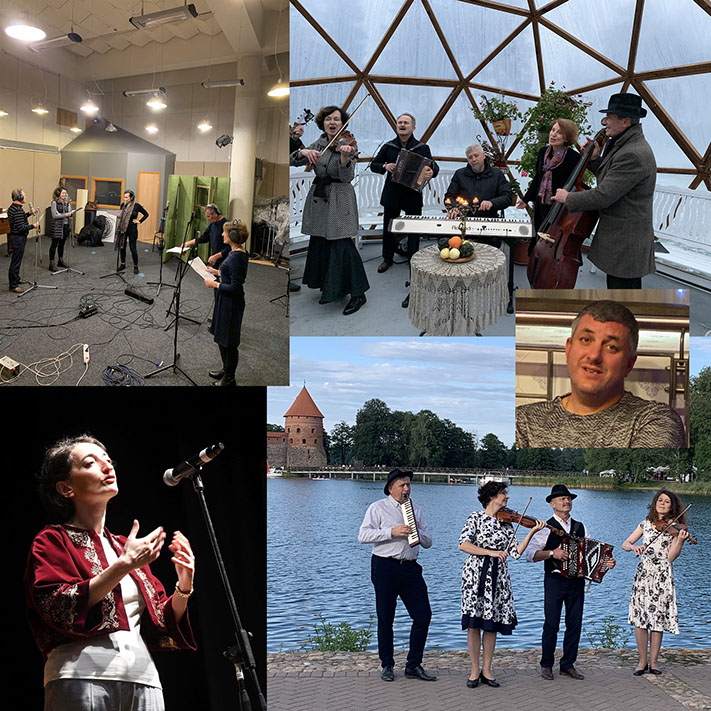Karaim language belongs to the northwestern group of Turkic languages. In 2020 throughout the world there are only 30 persons living in Lithuania that can speak the language. It is included in the UNESCO list of endangered languages. Lithuanian Karaim community and Karaim people seek spreading the knowledge about this language and promote its learning. The recent Community project is introducing a possibility to learn the Karaim language by singing (we thank the Lithuanian Department for national minorities for its support).
Four traditional songs of Lithuanian Karaims are for the first time presented in a new musical setting for instruments and several voices. You can now listen to these songs, sing along, learn the melodies and their words in a usual and karaoke adapted way. These are “Kybyn“, “Utrulamach“, “Širiń ėľ “, “Ijisi baraśkiniń“.
This project is implemented in cooperation with „Nalšia”, Vilnius city folklore ensemble and its musicians Ms Audronė Vakarinienė (leader; voice, violin), Mr Rimantas Dulkė (voice, concertina), Mr Jonas Kuklys (voice, basolia), Ms Asta Pereckienė (voice), Ms Miglė Ivaškevičienė (voice, violin), and a pianist Mr Rytas Lingė joining.
“Nalšia” as a group in all its activities is pursuing the mission of reviving and promoting folklore, mainly of Eastern Aukštaitija, former lands of Nalšia. To folklore the group attributes a broad scope of material between its oldest layers and songs of this century. The present project echoes well the concept of reviving the vanishing traditions, therefore the group‘s enthusiasm to get involved.
“Nalšia” is representing Lithuanian culture through diverse programmes already for more than 35 years, continously renewing its repertoire also from other cultures, like Georgian, Russian, or international heritage, looking for its spreading ways and links. ‚Nalšia‘ has recently presented several sets of programmes with Lithuanian and multicultural romances. The group has very courageously and competently taken a challenge of learning several songs in Karaim and brilliantly performed them.
As Ms Vakariniene has pointed out, “if tradition is dying out, it is a real cultural loss that does matter to all, not only to the keepers of that particular tradition. We want to come and help, so it is in this case, when there are only 30 people speaking the Karaim language and even less of them are able to sing. We hope our action will be instrumental and acceptable”.
Melodies in this project were adapted for instruments and voices by ©Audronė Vakarinienė and ©Rytas Lingė. Two Karaims, Mr Konstantinas Lavrinovičius and Ms Karina Firkavičiūtė participated as soloists in three songs. For the fourth it was Ms Audronė Vakarinienė, the leader of “Nalšia”. The recordings were produced at MAMAstudios and Garri Babadjan helped with project‘s IT implementation.
More about Karaim music can be found in this ebook (it exists also in printed version) published in English and in Polish with descriptions and also full lyrics of songs in Karaim, English and Polish languages:
Firkavičiūtė, Karina. Życie w pieśni karaimskiej. Bitik&LMiTA, 2016


